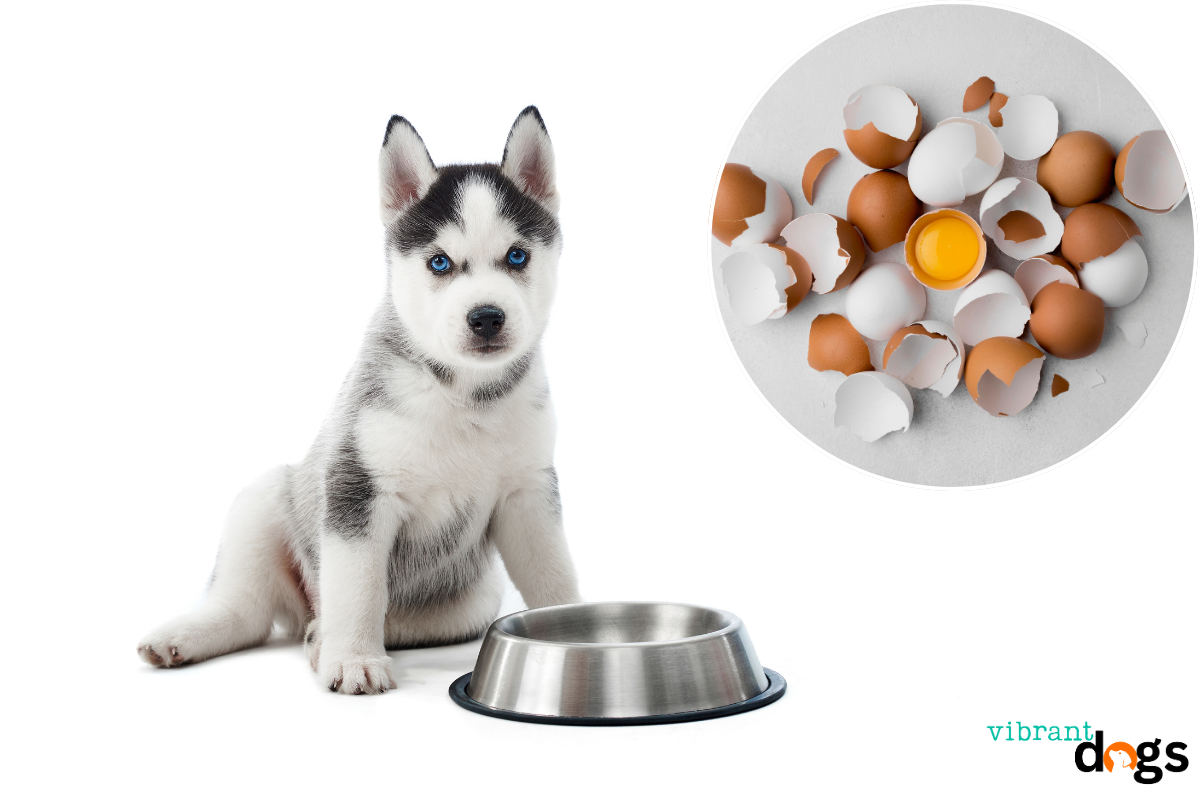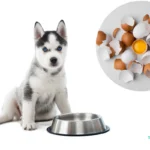Egg shells might seem like an odd choice for dogs, but they offer many health benefits. This guide will cover the safety, nutritional value, and how to prepare egg shells for your dog. If you’re thinking about adding calcium or just curious, we’ve got the info you need.
Key Takeaways
- Egg shells are a rich source of calcium and other essential minerals for dogs.
- Properly prepared egg shell powder can be a safe and highly bioavailable calcium supplement.
- Feeding egg shells to dogs can provide benefits for bone health, dental health, and overall wellbeing.
- It’s important to follow dosage guidelines and monitor your dog for any potential side effects.
- Consulting with your veterinarian is recommended before introducing egg shells into your dog’s diet.
Understanding the Nutritional Value of Egg Shells for Dogs
Egg shells for dogs can be a great addition to their diet. They are packed with essential minerals, especially calcium. This can greatly benefit your dog’s health and happiness.
Key Minerals and Nutrients in Egg Shells
Egg shells are mostly calcium. They also have other important minerals like:
- Calcium
- Phosphorus
- Magnesium
- Trace elements like strontium, fluoride, and silicon
Bioavailability of Calcium in Egg Shells
Egg shell powder has a high bioavailability of calcium. Research shows it’s better absorbed than other calcium sources. This means your dog can use the calcium more effectively for strong bones and other bodily functions.
Comparing Egg Shells to Other Calcium Sources
Calcium supplements give a lot of calcium at once. But egg shells for dogs offer a natural mix of calcium and other nutrients. This mix helps your dog’s body absorb and use these minerals better.
“Incorporating egg shell powder into your dog’s diet can be a simple and effective way to support their overall health and well-being.”
Can Dogs Eat Egg Shells: Safety and Benefits
Many dog owners wonder if dogs can eat eggshells. The answer is yes, but only if they are prepared correctly. Eggshells can be a safe and healthy part of your dog’s diet. Let’s look at how they can benefit your dog’s health.
The Safety of Feeding Eggshells to Dogs
Eggshells are safe for dogs to eat if they are clean and crushed. Raw eggshells can have harmful bacteria. But, when prepared right, eggshells are full of good nutrients.
Potential Health Benefits of Eggshells for Dogs
Eggshells are packed with calcium, which is key for strong bones and teeth in dogs. They also have phosphorus, magnesium, and other minerals that are good for your dog’s health. Eggshells can help prevent calcium shortages and support bone growth.
The calcium in eggshells is easy for dogs to absorb. This makes eggshells a better calcium source than some supplements.
“Eggshells are a natural, highly bioavailable source of calcium that can be a great addition to a dog’s diet.”
Adding eggshells to your dog’s diet can boost their health. It can also help prevent or treat calcium-related health issues.
The Right Way to Prepare Egg Shells for Your Dog
Feeding your dog egg shells can add important minerals like calcium to their diet. But, it’s key to prepare the egg shells right to keep them safe and easy for your dog to digest. Let’s look at how to prepare egg shells for your furry friend.
Cleaning and Sanitizing Methods
First, clean and sanitize the egg shells to get rid of any bad stuff. Rinse them under water to get rid of egg bits. Then, boil them for 5-10 minutes to kill bacteria. Or, bake them in the oven at 250°F (121°C) for 20-30 minutes for the same effect.
Creating Digestible Egg Shell Powder
After cleaning, grind the egg shells into a fine powder. Use a blender, coffee grinder, or mortar and pestle to do this. Aim for a powder that’s easy for your dog to digest. Make sure there are no big or sharp pieces that could hurt your dog’s stomach.
Storage Tips and Duration
- Put the egg shell powder in an airtight container in a cool, dry spot like the fridge or freezer.
- The powder can last up to 6 months if stored right.
- Always check the powder for any signs of spoilage, like color changes or bad smells, before giving it to your dog.
By following these steps, you can make sure the can dogs eat egg shells that are washed are safe and ready for your dog. Start with small amounts and watch how your dog reacts to make sure they can handle it.
Potential Risks and Precautions When Feeding Egg Shells
Egg shells can be good for your dog’s calcium needs. But, you must be careful when giving them to your pet. It’s important to think about the risks and take steps to keep your dog safe.
Choking Hazards
Egg shells can be a choking hazard if not ground up. Big pieces can block your dog’s airway. Make sure to crush the shells into tiny bits before adding them to your dog’s food.
Excessive Calcium Intake
Egg shells have a lot of calcium, which is good but can be bad in too much. Too much calcium can cause constipation, kidney stones, and bone problems. Always check the right amount for your dog’s size and weight.
| Potential Risks | Preventive Measures |
|---|---|
| Choking hazard | Grind egg shells into a fine powder |
| Excessive calcium intake | Follow recommended dosage guidelines |
Knowing the risks and taking steps to prevent them can help. This way, you can safely add can dogs have egg shells to your dog’s diet and get the benefits.
“Moderation is key when it comes to feeding egg shells to your dog. Always consult with your veterinarian to ensure you’re providing the right amount and type of supplementation.”
How Much Egg Shell Should You Give Your Dog
Adding egg shells for dogs to their diet can be very beneficial. But, it’s important to know how much to give based on your dog’s size and needs. Knowing the right amount of egg shell powder helps your dog get the calcium and nutrients they need without getting too much.
Dosage Guidelines by Dog Size
The right amount of egg shells for dogs depends on their weight. Here’s a general rule:
- Small dogs (under 20 lbs): 1/4 to 1/2 teaspoon of egg shell powder per day
- Medium dogs (20-50 lbs): 1/2 to 1 teaspoon of egg shell powder per day
- Large dogs (over 50 lbs): 1 to 2 teaspoons of egg shell powder per day
Frequency of Feeding
It’s better to give your dog the daily dose in smaller amounts. This makes it easier for them to absorb the calcium and nutrients.
Signs of Calcium Excess
While egg shells for dogs are good for calcium, watch for too much. Signs of too much calcium include:
- Constipation
- Increased thirst and urination
- Lethargy or decreased appetite
- Vomiting or diarrhea
If you see these signs, stop giving egg shells for dogs. Talk to your vet about the right amount of calcium for your dog.
Raw vs. Cooked Egg Shells: Which is Better?
Feeding egg shells to your dog can be a great way to add calcium. But, you might wonder if raw or cooked is better. Each option has its own benefits, depending on your dog’s needs and likes. Let’s look at the good and bad of each to help you decide.
Raw Egg Shells: Preserving Nutrients
Raw egg shells are full of calcium and minerals. Giving them to your dog keeps these nutrients strong and easy for your dog to use. This is great for dogs needing extra calcium, like those with bone or dental issues.
Cooked Egg Shells: Improved Digestibility
Cooked egg shells are easier for dogs to digest. Cooking breaks down the shell, making it simpler for your dog to get the calcium and minerals. This is good for dogs with sensitive stomachs or trouble with raw egg shells.
| Comparison | Raw Egg Shells | Cooked Egg Shells |
|---|---|---|
| Nutrient Preservation | Higher | Moderate |
| Digestibility | Moderate | Higher |
| Ease of Preparation | Easier | Requires additional steps |
| Potential Risks | Slightly higher risk of bacterial contamination | Lower risk of bacterial contamination |
Choosing between raw and cooked egg shells for your dog depends on their needs and your preferences. Always talk to your vet to find the best option for your dog.
When giving egg shells to your dog, make sure to prepare and store them safely. This ensures they are safe and nutritious for your dog. Check our previous sections for how to safely add egg shells to your dog’s diet.
Signs Your Dog Needs Calcium Supplementation
Keeping your dog’s calcium levels right is key for their health. Some dogs might need more calcium than usual. Knowing when your dog needs a calcium boost can help.
Common Calcium Deficiency Symptoms
- Weakness or lethargy
- Muscle spasms or tremors
- Slow growth or development in puppies
- Bone deformities or fractures
- Dental problems, such as tooth loss or gum disease
- Seizures or neurological issues
When to Consult Your Veterinarian
If you see any of these signs in your dog, see your vet. They can check your dog’s calcium levels and find the cause. They might suggest a calcium supplement or diet changes.
Remember, are egg shells good for dogs is something to think about carefully. Egg shells can be a good calcium source, but talk to your vet before adding them to your dog’s diet.
Knowing the signs of calcium deficiency and talking to your vet is important. This way, you can keep your dog healthy and happy. With the right care, your dog will stay in top shape.
Incorporating Egg Shells into Your Dog’s Diet
Adding egg shell powder to your dog’s food is a great way to boost calcium and other nutrients. Start by adding a small amount to their meals. This lets their body get used to it. You can mix it into their food or sprinkle it on top.
Choose a high-quality, finely ground egg shell powder for the best results. This ensures your dog can digest it easily. Make sure it’s not sharp to avoid any stomach problems. Always check with your vet to find out how much to give based on your dog’s size and health.
Keep an eye on how your dog reacts to the egg shell powder. Look out for signs like vomiting, diarrhea, or not wanting to eat. If you notice any issues, adjust how much you give them. With the right amount and watching your dog closely, you can keep their calcium levels up and help them stay healthy.




